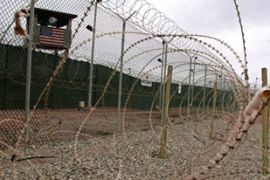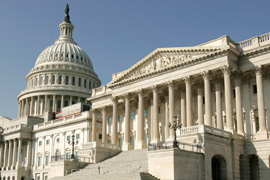Bin Laden driver evidence dismissed
“Coercive” evidence ruled inadmissible as suspect is linked to US congress attack plans.

Monica Villamizar, Al Jazeera’s correspondent, said the Hamdan trial will be watched closely by representatives of other detainees.
The prosecutor has accused Hamdan of being involved in plotting with al-Qaeda, claiming that he had “knowledge” of targets in the September 11 attacks, she said.
The defence, however, has denied any involvement with al-Qaeda, labelling Hamdan’s role as that of a mere driver looking to support his family.
The defence has also criticised the military commission, saying that “it does not abide by the US constitution”, Villamizar said.
September 11 attacks
Timothy Stone, a Navy lieutenant commander, told the six-member jury of US military officers that Hamdan earned the trust of bin Laden during a trial period from 1996 to 1998 and helped him flee after attacks on US embassies in East Africa in 1998 and the September 11 attacks.
“He served as bodyguard, driver, transported and delivered weapons, ammunition and supplies to al-Qaeda,” Stone said in his opening argument.
Hamdan, the first prisoner to face a US war-crimes trial since World War II, heard bin Laden say the aircraft was heading for “the dome”, an apparent reference to the US congress building, Stone said.
“Virtually no one knew the intended target, but the accused knew,” Stone said.
The airliner crashed in a Pennsylvania field after passengers overcame the hijackers.
‘Coercive confessions’
Captain Keith Allred, the military officer presiding over the tribunal, ruled prosecutors could not use some evidence because it was obtained in “coercive” conditions when Hamdan was held at a base in Bagram, Afghanistan after his capture in 2001.
Allred also left open the possibility of throwing out other evidence from an interrogation in 2003.
But the judge rejected demands from defence lawyers to prohibit statements made by Hamdan during his six years at the Guantanamo camp.
Allred’s decision on evidence obtained by coercive means could present difficulties in future trials at Guantanamo, including the case of Khalid Sheikh Mohammed, the alleged al-Qaeda mastermind behind the September 11 attacks.
Working driver
 |
| Hamdan allegedly knew of an attack on the US congress building [EPA] |
Hamdan was captured in Afghanistan before being moved to the Guantanamo prison.
Harry Schneider, Hamdan’s lawyer, described him as a poor Yemeni father of two young children who lost his parents at a young age and lived on the streets, where he developed a knack for fixing cars.
“The evidence is that he worked for wages. He didn’t wage attacks on America,” he said.
“He had a job because he had to earn a living, not because he had a jihad against America.”
Hamdan got his pay directly from bin Laden, not from a “terrorist” organisation, Schneider said.
The Yemeni faces a life sentence in prison if convicted.
The defence plans to question at least two suspected September 11 planners, including Khalid Sheikh Mohammed, who is also held at Guantanamo Bay.
Earlier this month five men, including Mohammed, were charged with crimes relating to the September 11, 2001, attacks, which killed almost 3,000 people.
The war crimes tribunal system has been heavily criticised by human and legal rights groups as unfair.
Detainees have been held for years without charges and the US says they can be held until “the end of hostilities”.
The trial continues.